The ITIL Intermediate Qualification: Service Offerings and Agreements (SOA) Certificate is a freestanding qualification, but is also part of the ITIL Intermediate Capability stream, and one of the modules that leads to the ITIL Expert Certificate in IT Service Management. The purpose of this training module and the associated exam and certificate is, respectively, to impart, test, and validate the knowledge on industry practices in service management as documented in the ITIL Service Lifecycle core publications. The ITIL Certificate in Service Offerings and Agreements is intended to enable the holders of the certificate to apply SOA practices service management lifecycle and specifically in the following key ITIL process, role and function areas:
• Service portfolio management
• Service catalogue management
• Service level management
• Demand management
• Supplier management
• Financial management for IT services
• Business relationship management
- Introduction to service offerings and agreements (SOA)
- Full understanding of SOA terms and core concepts
- The value to the business of SOA activities
- The lifecycle within the SOA context
- How services deliver value to customers and the business and the relevance to the SOA processes
- How requirements are identified through the SOA processes
- Understanding return on investment (ROI) and the business case
- Service portfolio management
- The knowledge, interpretation and analysis of service portfolio
management principles, techniques and relationships and their application for the effective management of service offerings and agreements- Service portfolio management, including concepts, methods, activities, roles and operation as well as its organizational structure and the interfaces with other processes
- Service portfolio management in relationship to the service catalogue and service pipeline and how these support SOA
- Metrics and critical success factors (CSFs) associated with service portfolio management in support of SOA
- The knowledge, interpretation and analysis of service portfolio
- Service catalogue management
- The knowledge, interpretation and analysis of service catalogue
management principles, techniques and relationships and their application for the effective management of service offerings and agreements- Service catalogue management, including its concepts, activities, roles and operation as well as its organizational structure and the interfaces with other processes
- Service catalogue in relationship to the service portfolio, the business catalogue, the technical service catalogue and how these components are used to ensure service quality within SOA
- Metrics and CSFs associated with service catalogue management in support of SOA
- The knowledge, interpretation and analysis of service catalogue
- Service level management
- The knowledge, interpretation and analysis of service level management
principles, techniques and relationships and their application for the effective management of service offerings and agreements- Service level management (SLM), including its concepts, activities, roles and operation as well as its organizational structure and any interfaces with other processes
- SLM components and activities, including service level agreements (SLAs) structures, service level requirements (SLRs), operational level agreements (OLAs), CSFs, underpinning contracts (UCs), their metrics, performance and monitoring
- How these components are used to ensure service quality within SOA
- The knowledge, interpretation and analysis of service level management
- Demand management
- The knowledge, interpretation and analysis of demand management
principles, techniques and relationships and their application for the effective management of service offerings and agreements- Demand management process, including its concepts, activities, roles and operation as well as its organizational structure and any interfaces with other processes
- Demand for services especially in relation to patterns of business activity and how it is used within SOA
- Service portfolio interaction with demand management and how demand can be managed for service in relation to providing business benefits and in support of SOA
- Metrics and CSFs associated with demand management in support of SOA
- The knowledge, interpretation and analysis of demand management
- Supplier management
- The knowledge, interpretation and analysis of supplier management
principles, techniques and relationships and the application of them for the effective management of service offerings and agreements- Supplier management process inclusive of its concepts, activities, roles and operation including its organizational structure as well as any interfaces with other processes
- Supplier management components and activities (for example supplier categorization, supplier evaluation, supplier and contract database, metrics and CSFs) and how these are used to ensure service quality within SOA
- The knowledge, interpretation and analysis of supplier management
- Financial Management for IT services
- The knowledge, interpretation and analysis of financial management for IT
services principles, techniques and relationships and their application for the effective management of service offerings and agreements- Financial management for IT services, including its concepts, activities, roles and operation as well as its organizational structure and any interfaces with other processes
- Financial management for IT services components and activities, including budgeting, accounting and charging and how these are used to ensure service quality within SOA
- Metrics and CSFs associated with financial management for IT services in support of SOA
- The knowledge, interpretation and analysis of financial management for IT
- Business relationship management
- The knowledge, interpretation and analysis of business relationship
management principles, techniques and relationships and their application for the effective management of service offerings and agreements- Business relationship management, including its concepts, activities, roles and operation as well as its organizational structure and any interfaces with other processes
- Metrics and CSFs associated with business relationship management in support of SOA
- The knowledge, interpretation and analysis of business relationship
- SOA roles and responsibilities
- The knowledge, interpretation and analysis of SOA roles and their
application for the effective management of service offerings and agreement- The roles and responsibilities related to all of the SOA processes
- The knowledge, interpretation and analysis of SOA roles and their
- Technology and implementation considerations
- The knowledge, interpretation and analysis of technology and
implementation and their application for the effective management of service offerings and agreements- Service management tools and where/how they would be used within SOA for process implementation
- The tools that support SOA
- What best practices should be used in order to alleviate challenges and risks when implementing
- Service Management technologies and designing technology architectures
- The knowledge, interpretation and analysis of technology and
• Chief information officers (CIOs)
• Chief technology officers (CTOs)
• Managers
• Supervisory staff
• Team leaders
• Service designers
• IT architects
• IT planners
• IT consultants
• IT audit managers
• IT security managers
Prerequisite Entry Criteria
Candidates wishing to be trained and examined for this qualification must already hold the ITIL Foundation Certificate in IT Service Management which must be presented as documentary evidence to gain admission Candidates who hold the following ITIL qualifications are also eligible, and similar evidence will be required:
• Earlier ITIL (V2) Foundation plus Foundation Bridge
• ITIL Expert Certificate in IT Service Management (achieved via Service Manager or Practitioner bridging routes).
Eligibility for Examination
To be eligible for the ITIL Intermediate Qualification: RCV, candidates must have fulfilled the following requirements:
• At least 24 contact hours (hours of instruction, excluding breaks, with an Accredited Training Organization (ATO) or an accredited e-learning solution) for this syllabus, as part of a formal, approved training course/scheme
• A basic IT literacy and around 2 years IT experience are highly desirable
• Hold the ITIL Foundation Certificate in IT Service Management
• It is also recommended that candidates should complete at least 21 hours of personal study by reviewing the syllabus and the ITIL Service Transition publication in preparation for the examination
Format of the Examination
- Type: Eight (8) multiple choice, scenario-based, gradient-scored questions.
Each question will have 4 possible answer options, one which is worth 5
marks, one which is worth 3 marks, one which is worth 1 mark, and one which
is a distracter and achieves no marks. - Duration Maximum 90 minutes for all candidates in their respective language
Provisions for Additional Time relating to language, Candidates completing an exam in a language that is not their mother tongue have a maximum of 120 minutes to complete the exam and are allowed the use of a dictionary. - Supervised Yes
- Open Book No
- Pass Score 28/40 or 70%
Overview
ITIL Intermediate Service Offering And Agreement Training & Certification
The ITIL Intermediate Qualification: Service Offerings and Agreements (SOA) Certificate is a freestanding qualification, but is also part of the ITIL Intermediate Capability stream, and one of the modules that leads to the ITIL Expert Certificate in IT Service Management. The purpose of this training module and the associated exam and certificate is, respectively, to impart, test, and validate the knowledge on industry practices in service management as documented in the ITIL Service Lifecycle core publications.
The ITIL Certificate in Service Offerings and Agreements is intended to enable the holders of the certificate to apply SOA practices service management lifecycle and specifically in the following key ITIL process, role and function areas:
• Service portfolio management
• Service catalogue management
• Service level management
• Demand management
• Supplier management
• Financial management for IT services
• Business relationship management
Course Outline
ITIL Intermediate Service Offering And Agreement Training & Certification
- Introduction to service offerings and agreements (SOA)
- Full understanding of SOA terms and core concepts
- The value to the business of SOA activities
- The lifecycle within the SOA context
- How services deliver value to customers and the business and the relevance to the SOA processes
- How requirements are identified through the SOA processes
- Understanding return on investment (ROI) and the business case
- Service portfolio management
- The knowledge, interpretation and analysis of service portfolio
management principles, techniques and relationships and their application for the effective management of service offerings and agreements- Service portfolio management, including concepts, methods, activities, roles and operation as well as its organizational structure and the interfaces with other processes
- Service portfolio management in relationship to the service catalogue and service pipeline and how these support SOA
- Metrics and critical success factors (CSFs) associated with service portfolio management in support of SOA
- The knowledge, interpretation and analysis of service portfolio
- Service catalogue management
- The knowledge, interpretation and analysis of service catalogue
management principles, techniques and relationships and their application for the effective management of service offerings and agreements- Service catalogue management, including its concepts, activities, roles and operation as well as its organizational structure and the interfaces with other processes
- Service catalogue in relationship to the service portfolio, the business catalogue, the technical service catalogue and how these components are used to ensure service quality within SOA
- Metrics and CSFs associated with service catalogue management in support of SOA
- The knowledge, interpretation and analysis of service catalogue
- Service level management
- The knowledge, interpretation and analysis of service level management
principles, techniques and relationships and their application for the effective management of service offerings and agreements- Service level management (SLM), including its concepts, activities, roles and operation as well as its organizational structure and any interfaces with other processes
- SLM components and activities, including service level agreements (SLAs) structures, service level requirements (SLRs), operational level agreements (OLAs), CSFs, underpinning contracts (UCs), their metrics, performance and monitoring
- How these components are used to ensure service quality within SOA
- The knowledge, interpretation and analysis of service level management
- Demand management
- The knowledge, interpretation and analysis of demand management
principles, techniques and relationships and their application for the effective management of service offerings and agreements- Demand management process, including its concepts, activities, roles and operation as well as its organizational structure and any interfaces with other processes
- Demand for services especially in relation to patterns of business activity and how it is used within SOA
- Service portfolio interaction with demand management and how demand can be managed for service in relation to providing business benefits and in support of SOA
- Metrics and CSFs associated with demand management in support of SOA
- The knowledge, interpretation and analysis of demand management
- Supplier management
- The knowledge, interpretation and analysis of supplier management
principles, techniques and relationships and the application of them for the effective management of service offerings and agreements- Supplier management process inclusive of its concepts, activities, roles and operation including its organizational structure as well as any interfaces with other processes
- Supplier management components and activities (for example supplier categorization, supplier evaluation, supplier and contract database, metrics and CSFs) and how these are used to ensure service quality within SOA
- The knowledge, interpretation and analysis of supplier management
- Financial Management for IT services
- The knowledge, interpretation and analysis of financial management for IT
services principles, techniques and relationships and their application for the effective management of service offerings and agreements- Financial management for IT services, including its concepts, activities, roles and operation as well as its organizational structure and any interfaces with other processes
- Financial management for IT services components and activities, including budgeting, accounting and charging and how these are used to ensure service quality within SOA
- Metrics and CSFs associated with financial management for IT services in support of SOA
- The knowledge, interpretation and analysis of financial management for IT
- Business relationship management
- The knowledge, interpretation and analysis of business relationship
management principles, techniques and relationships and their application for the effective management of service offerings and agreements- Business relationship management, including its concepts, activities, roles and operation as well as its organizational structure and any interfaces with other processes
- Metrics and CSFs associated with business relationship management in support of SOA
- The knowledge, interpretation and analysis of business relationship
- SOA roles and responsibilities
- The knowledge, interpretation and analysis of SOA roles and their
application for the effective management of service offerings and agreement- The roles and responsibilities related to all of the SOA processes
- The knowledge, interpretation and analysis of SOA roles and their
- Technology and implementation considerations
- The knowledge, interpretation and analysis of technology and
implementation and their application for the effective management of service offerings and agreements- Service management tools and where/how they would be used within SOA for process implementation
- The tools that support SOA
- What best practices should be used in order to alleviate challenges and risks when implementing
- Service Management technologies and designing technology architectures
- The knowledge, interpretation and analysis of technology and
Who Should Attend
ITIL Intermediate Service Offering And Agreement Training & Certification
Chief information officers (CIOs)
• Chief technology officers (CTOs)
• Managers
• Supervisory staff
• Team leaders
• Service designers
• IT architects
• IT planners
• IT consultants
• IT audit managers
• IT security managers
Exam Information
ITIL Intermediate Service Offering And Agreement Training & Certification
Prerequisite Entry Criteria
ITIL Intermediate Service Offering And Agreement Training & Certification
Candidates wishing to be trained and examined for this qualification must already hold the ITIL Foundation Certificate in IT Service Management which must be presented as documentary evidence to gain admission Candidates who hold the following ITIL qualifications are also eligible, and similar evidence will be required:
• Earlier ITIL (V2) Foundation plus Foundation Bridge
• ITIL Expert Certificate in IT Service Management (achieved via Service Manager or Practitioner bridging routes).
Eligibility for Examination
ITIL Intermediate Service Offering And Agreement Training & Certification
To be eligible for the ITIL Intermediate Qualification: RCV, candidates must have fulfilled the following requirements:
• At least 24 contact hours (hours of instruction, excluding breaks, with an Accredited Training Organization (ATO) or an accredited e-learning solution) for this syllabus, as part of a formal, approved training course/scheme
• A basic IT literacy and around 2 years IT experience are highly desirable
• Hold the ITIL Foundation Certificate in IT Service Management
• It is also recommended that candidates should complete at least 21 hours of personal study by reviewing the syllabus and the ITIL Service Transition publication in preparation for the examination
Format of the Examination
ITIL Intermediate Service Offering And Agreement Training & Certification
- Type: Eight (8) multiple choice, scenario-based, gradient-scored questions.
Each question will have 4 possible answer options, one which is worth 5
marks, one which is worth 3 marks, one which is worth 1 mark, and one which
is a distracter and achieves no marks. - Duration Maximum 90 minutes for all candidates in their respective language
Provisions for Additional Time relating to language, Candidates completing an exam in a language that is not their mother tongue have a maximum of 120 minutes to complete the exam and are allowed the use of a dictionary. - Supervised Yes
- Open Book No
- Pass Score 28/40 or 70%
ITIL Intermediate Continual Service Improvement http://www.info-savvy.com/product/itil-intermediate-continual-service-improvement/
ITIL Expert Managing Across The Lifecycle http://www.info-savvy.com/product/itil-expert-managing-across-the-lifecycle/
ITIL Foundation http://www.info-savvy.com/product/itil-foundation/
You must be logged in to post a review.

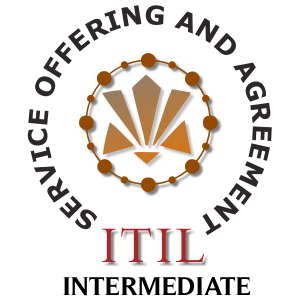


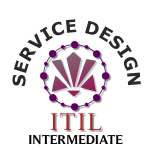
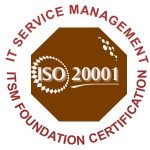

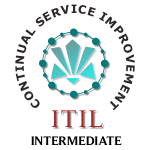

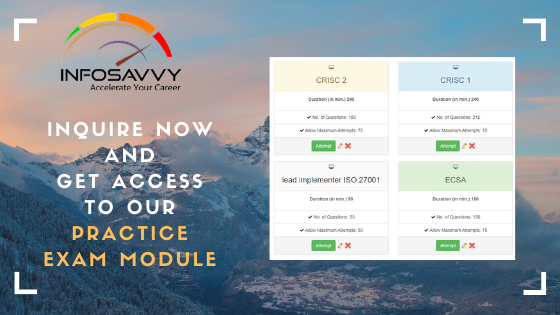
Reviews
There are no reviews yet.